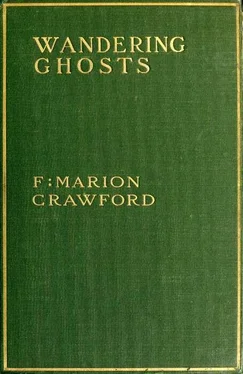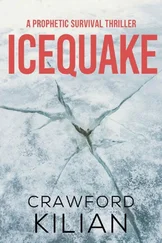F. Crawford - Wandering Ghosts
Здесь есть возможность читать онлайн «F. Crawford - Wandering Ghosts» весь текст электронной книги совершенно бесплатно (целиком полную версию без сокращений). В некоторых случаях можно слушать аудио, скачать через торрент в формате fb2 и присутствует краткое содержание. Год выпуска: 2012, Жанр: Ужасы и Мистика, на английском языке. Описание произведения, (предисловие) а так же отзывы посетителей доступны на портале библиотеки ЛибКат.
- Название:Wandering Ghosts
- Автор:
- Жанр:
- Год:2012
- ISBN:нет данных
- Рейтинг книги:3 / 5. Голосов: 1
-
Избранное:Добавить в избранное
- Отзывы:
-
Ваша оценка:
- 60
- 1
- 2
- 3
- 4
- 5
Wandering Ghosts: краткое содержание, описание и аннотация
Предлагаем к чтению аннотацию, описание, краткое содержание или предисловие (зависит от того, что написал сам автор книги «Wandering Ghosts»). Если вы не нашли необходимую информацию о книге — напишите в комментариях, мы постараемся отыскать её.
Wandering Ghosts — читать онлайн бесплатно полную книгу (весь текст) целиком
Ниже представлен текст книги, разбитый по страницам. Система сохранения места последней прочитанной страницы, позволяет с удобством читать онлайн бесплатно книгу «Wandering Ghosts», без необходимости каждый раз заново искать на чём Вы остановились. Поставьте закладку, и сможете в любой момент перейти на страницу, на которой закончили чтение.
Интервал:
Закладка:
"And that poor thing's body is there still, I suppose," said Holger. "Is it quite dead yet, I wonder?"
I wonder, too. But whether it be dead or alive, I should hardly care to see it, even in broad daylight. Antonio is as grey as a badger, and he has never been quite the same man since that night.
THE UPPER BERTH
CHAPTER I
Somebody asked for the cigars. We had talked long, and the conversation was beginning to languish; the tobacco smoke had got into the heavy curtains, the wine had got into those brains which were liable to become heavy, and it was already perfectly evident that, unless somebody did something to rouse our oppressed spirits, the meeting would soon come to its natural conclusion, and we, the guests, would speedily go home to bed, and most certainly to sleep. No one had said anything very remarkable; it may be that no one had anything very remarkable to say. Jones had given us every particular of his last hunting adventure in Yorkshire. Mr. Tompkins, of Boston, had explained at elaborate length those working principles, by the due and careful maintenance of which the Atchison, Topeka, and Santa Fé Railroad not only extended its territory, increased its departmental influence, and transported live stock without starving them to death before the day of actual delivery, but, also, had for years succeeded in deceiving those passengers who bought its tickets into the fallacious belief that the corporation aforesaid was really able to transport human life without destroying it. Signor Tombola had endeavoured to persuade us, by arguments which we took no trouble to oppose, that the unity of his country in no way resembled the average modern torpedo, carefully planned, constructed with all the skill of the greatest European arsenals, but, when constructed, destined to be directed by feeble hands into a region where it must undoubtedly explode, unseen, unfeared, and unheard, into the illimitable wastes of political chaos.
It is unnecessary to go into further details. The conversation had assumed proportions which would have bored Prometheus on his rock, which would have driven Tantalus to distraction, and which would have impelled Ixion to seek relaxation in the simple but instructive dialogues of Herr Ollendorff, rather than submit to the greater evil of listening to our talk. We had sat at table for hours; we were bored, we were tired, and nobody showed signs of moving.
Somebody called for cigars. We all instinctively looked towards the speaker. Brisbane was a man of five-and-thirty years of age, and remarkable for those gifts which chiefly attract the attention of men. He was a strong man. The external proportions of his figure presented nothing extraordinary to the common eye, though his size was about the average. He was a little over six feet in height, and moderately broad in the shoulder; he did not appear to be stout, but, on the other hand, he was certainly not thin; his small head, was supported by a strong and sinewy neck; his broad, muscular hands appeared to possess a peculiar skill in breaking walnuts without the assistance of the ordinary cracker, and seeing him in profile, one could not help remarking the extraordinary breadth of his sleeves, and the unusual thickness of his chest. He was one of those men who are commonly spoken of among men as deceptive; that is to say, that though he looked exceedingly strong he was in reality very much stronger than he looked. Of his features I need say little. His head is small, his hair is thin, his eyes are blue, his nose is large, he has a small moustache and a square jaw. Everybody knows Brisbane, and when he asked for a cigar everybody looked at him.
"It is a very singular thing," said Brisbane.
Everybody stopped talking. Brisbane's voice was not loud, but possessed a peculiar quality of penetrating general conversation, and cutting it like a knife. Everybody listened. Brisbane, perceiving that he had attracted their general attention, lit his cigar with great equanimity.
"It is very singular," he continued, "that thing about ghosts. People are always asking whether anybody has seen a ghost. I have."
"Bosh! What, you? You don't mean to say so, Brisbane? Well, for a man of his intelligence!"
A chorus of exclamations greeted Brisbane's remarkable statement. Everybody called for cigars, and Stubbs, the butler, suddenly appeared from the depths of nowhere with a fresh bottle of dry champagne. The situation was saved; Brisbane was going to tell a story.
I am an old sailor, said Brisbane, and as I have to cross the Atlantic pretty often, I have my favourites. Most men have their favourites. I have seen a man wait in a Broadway bar for three-quarters of an hour for a particular car which he liked. I believe the bar-keeper made at least one-third of his living by that man's preference. I have a habit of waiting for certain ships when I am obliged to cross that duck-pond. It may be a prejudice, but I was never cheated out of a good passage but once in my life. I remember it very well; it was a warm morning in June, and the Custom House officials, who were hanging about waiting for a steamer already on her way up from the Quarantine, presented a peculiarly hazy and thoughtful appearance. I had not much luggage—I never have. I mingled with a crowd of passengers, porters, and officious individuals in blue coats and brass buttons, who seemed to spring up like mushrooms from the deck of a moored steamer to obtrude their unnecessary services upon the independent passenger. I have often noticed with a certain interest the spontaneous evolution of these fellows. They are not there when you arrive; five minutes after the pilot has called "Go ahead!" they, or at least their blue coats and brass buttons, have disappeared from deck and gangway as completely as though they had been consigned to that locker which tradition unanimously ascribes to Davy Jones. But, at the moment of starting, they are there, clean shaved, blue coated, and ravenous for fees. I hastened on board. The Kamtschatka was one of my favourite ships. I say was, because she emphatically no longer is. I cannot conceive of any inducement which could entice me to make another voyage in her. Yes, I know what you are going to say. She is uncommonly clean in the run aft, she has enough bluffing off in the bows to keep her dry, and the lower berths are most of them double. She has a lot of advantages, but I won't cross in her again. Excuse the digression. I got on board. I hailed a steward, whose red nose and redder whiskers were equally familiar to me.
"One hundred and five, lower berth," said I, in the businesslike tone peculiar to men who think no more of crossing the Atlantic than taking a whiskey cocktail at down-town Delmonico's.
The steward took my portmanteau, greatcoat, and rug. I shall never forget the expression of his face. Not that he turned pale. It is maintained by the most eminent divines that even miracles cannot change the course of nature. I have no hesitation in saying that he did not turn pale; but, from his expression, I judged that he was either about to shed tears, to sneeze, or to drop my portmanteau. As the latter contained two bottles of particularly fine old sherry presented to me for my voyage by my old friend Snigginson van Pickyns, I felt extremely nervous. But the steward did none of these things.
"Well, I'm d——d!" said he in a low voice, and led the way.
I supposed my Hermes, as he led me to the lower regions, had had a little grog, but I said nothing and followed him. 105 was on the port side, well aft. There was nothing remarkable about the state-room. The lower berth, like most of those upon the Kamtschatka , was double. There was plenty of room; there was the usual washing apparatus, calculated to convey an idea of luxury to the mind of a North American Indian; there were the usual inefficient racks of brown wood, in which it is more easy to hang a large-sized umbrella than the common tooth-brush of commerce. Upon the uninviting mattresses were carefully folded together those blankets which a great modern humourist has aptly compared to cold buckwheat cakes. The question of towels was left entirely to the imagination. The glass decanters were filled with a transparent liquid faintly tinged with brown, but from which an odour less faint, but not more pleasing, ascended to the nostrils, like a far-off sea-sick reminiscence of oily machinery. Sad-coloured curtains half closed the upper berth. The hazy June daylight shed a faint illumination upon the desolate little scene. Ugh! how I hate that state-room!
Читать дальшеИнтервал:
Закладка:
Похожие книги на «Wandering Ghosts»
Представляем Вашему вниманию похожие книги на «Wandering Ghosts» списком для выбора. Мы отобрали схожую по названию и смыслу литературу в надежде предоставить читателям больше вариантов отыскать новые, интересные, ещё непрочитанные произведения.
Обсуждение, отзывы о книге «Wandering Ghosts» и просто собственные мнения читателей. Оставьте ваши комментарии, напишите, что Вы думаете о произведении, его смысле или главных героях. Укажите что конкретно понравилось, а что нет, и почему Вы так считаете.












